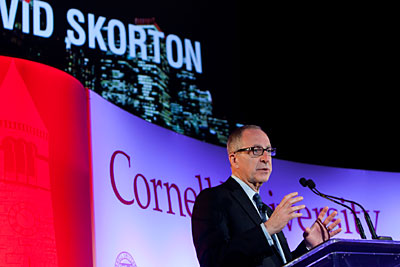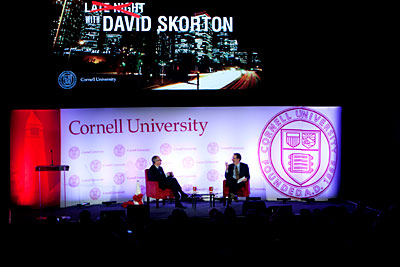L.A. nets a big crowd and warm reception for Skorton
By Jennifer Campbell


LOS ANGELES -- Oscars and Emmys, Cornelia the cow and the Cornell bear were on hand to roll out the Big Red carpet for more than 450 Cornellians gathered at Fox Studios in Los Angeles on March 14 for an "Early Evening with David Skorton."
For many of them, this was their first personal exposure to Skorton. The president took the opportunity to connect with the audience about his own Los Angeles roots and recognize local donors and Cornell Club of L.A. leaders.
Skorton also set the stage for Cornell heading into its 2015 sesquicentennial, emphasizing the need for faculty hiring efforts in particular. Trustees and campaign co-chairs Steve Ashley '62 and Jan Rock Zubrow '77 opened the event and framed faculty renewal efforts as a central fundraising priority.
Jane Lynch's March 14 appearance on "The Tonight Show with Jay Leno" kept her from stopping by, but she did send a video greeting. "In 1984 I got my M.F.A. in acting, and that M.F.A. has netted me exactly nothing in real life," Lynch joked. "I didn't win this [Emmy] because I got an M.F.A. from Cornell. However, Cornell is an Ivy League school, and people are impressed that I went there."
That playful tone pervaded the "Early Evening" event, which saw Skorton threatening to sing the Van Nuys High School Class of 1967 song; Ed Zuckerman '70 delivering a send-up of late-1960s counterculture; a mini-Dragon Day parade (sans conflagration) meandering through the Fox lot; and more than a few alumni joking with a living statue of A.D. White -- perched at the center of a film set that normally stands in for New York City, but that night played backdrop to a pastiche of Cornell props and party fare.
Kevin Reilly '84, president of entertainment for Fox Broadcasting, made it possible for the event to be held at Fox Studios -- and for Lynch, whose hit show "Glee" is a Fox production, to send her greetings.
Describing Cornell's founding vision of "any person … any study," Skorton said that "amazingly, Cornellians have managed to live that vision for almost 150 years. When we hit the 150-year mark, we have to have an aspiration that lines up with what people have called the first truly American university. And the main core of that university is the faculty."
Zuckerman, a screenwriter and author who was editor of The Cornell Daily Sun during the student takeover of Willard Straight Hall in 1969, interviewed the president as part of the program. Contrasting today's political and economic environment with that of his own college days, Zuckerman said, "Kids today are going to college during a time of generalized anxiety, economic distress. ... Today, what is college for?"
"Half the college students in the country go to community colleges -- our most agile, ubiquitous forms of higher education," Skorton responded, noting that the need for greater economic security is still a major force in students' decisions.
But beyond that, he said, are "all the clichés we use, in which I really believe -- that you learn to think critically, [and] have the guts to follow a new course." The main benefit, he said, is that "you come out the other end different from when you went in."
This idea of college as a crucible of socialization and growth was also reflected in Skorton's responses to questions that arose about student drinking and the Greek system.
"Students at that age, just like every one of us in or own lives, are trying to find equilibrium -- between being a workaholic and not working enough, doing too much of A and not enough of B. We do have to support the Greek system and a normal social equilibrium-finding experience for students," he said, noting that establishing clear consequences for risky behavior is equally vital.
Zuckerman's final question brought the conversation back to the university's broader strategic direction. "Does Cornell need to be reimagined?" he asked.
"Not the transaction between student and teacher. Not the transaction between researcher and problem," Skorton said. "It does not need reimagining in terms of its excellence and traditions, and that feeling in your heart." But having a strategic plan, he said, allows Cornell to "see on the horizon being even better than we are."
Get Cornell news delivered right to your inbox.
Subscribe